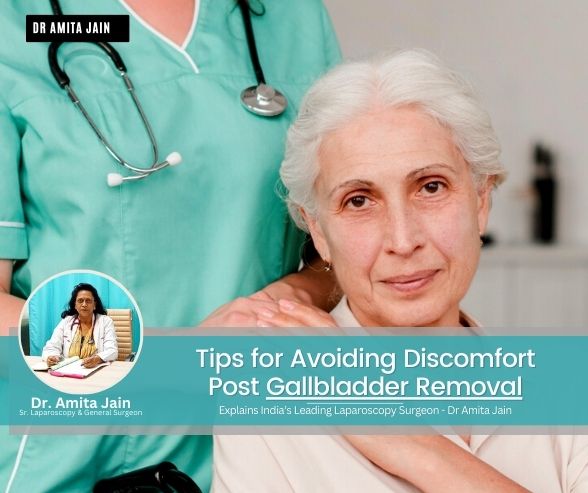Your gallbladder has an important role in your digestion, but you hardly pay attention to it until problems occur. This small, pear-shaped organ stores bile made in your liver that assists you digest food and break up fats. When you have gallbladder issues, you mostly experience multiple digestive symptoms, including:
- Bloating after eating
- Not able to tolerate fatty foods
- Indigestion
- Nausea and vomiting
- Having a feeling of fullness
While you can continue to live a normal and healthy life without your gallbladder, you can still experience various uncomfortable digestive symptoms after your surgery.
In Delhi and NCR Dr Amita Jain is a skilled general and laparoscopic surgeon who provides both traditional and advanced laparoscopic methods for gallbladder removal. She recommends the following five simple tips to prevent experiencing continued digestive discomfort post your procedure.
Add foods into your diet slowly
It is tempting to splurge on all of your favourite dishes after surgery. But it is crucial to give your body some time to adjust after losing your gallbladder. It is recommended to strictly limit your diet to foods that are easy to digest, such as broths, clear liquids, and gelatin.
Pay attention to smaller portions
One of the simplest methods to avoid any digestive upset post your gallbladder surgery is by eating multiple small meals throughout your day, instead of 3 large ones. You must also refrain from foods having strong odours or that cause gas, as well as spicy or fried items that would be harder to digest.
Have a low-fat diet
A certain way to trigger bloating, pain, and diarrhoea post your gallbladder surgery is by eating high-fat foods. Rather, focus on low-fat foods so fats do not exceed 30% of your caloric intake. A simple way to make this change is by reading food labels. Look for alternatives that contain less than 3 grams of fat per serving.
Slowly reintroduce high-fibre foods
No matter how much you have been missing whole-grain bread, seeds, broccoli, or cauliflower, these nutrient-rich, high-fibre foods may cause gas and bloating. To avoid any such discomfort, reintroduce these foods slowly and in small amounts.
Have a food journal
It is recommended to keep a food diary to track your reactions to specific items. This method makes it simpler to identify issues and remember which food items you can eat and which cause discomfort.
In several cases, you can generally resume your normal diet within about one month of having gallbladder surgery. If you continue to have uneasiness or digestive issues post your procedure despite taking these steps, contact your doctor immediately.

For getting more information on gallbladder surgery, you may contact Dr Amita Jain, one of the best Gallbladder surgeons in Delhi in the field of Laparoscopic Surgery.

Dr Amita Jain is one of India’s most distinguished and experienced female surgeons, known for her unmatched expertise in general and laparoscopic surgery. With over 29 years of surgical excellence, Dr Amita Jain has built a reputation for precision, compassionate care, and advanced surgical techniques.
Dr Amita Jain has successfully performed a wide range of complex general surgeries, including both open and minimally invasive procedures, with a strong focus on trauma care, onco-surgical techniques, and reconstructive surgeries. Her areas of specialisation include (including Gallbladder stone removal, appendix removal, hernia repair surgery, piles and fissure surgeries). She was the Professor of Surgery at the Army College of Medical Sciences and Base Hospital, Delhi Cantt. In 1994, she was commissioned asa Surgeon under the United Nations Mission in Congo. From 2020 to 2022, she worked with Bansals Hospital. Currently, Dr Amita Jain is the Senior General and Laparoscopic Surgeon at Rainbow Children Hospitals (Malviya Nagar, Delhi), Artemis Lite: Multi-Speciality Care Hospital (New Friends Colony, New Delhi) and at Rosewalk – Luxury Maternity Hospital in Delhi (Panchsheel Park, Delhi)
Call Us at +(91) 882-6615301
